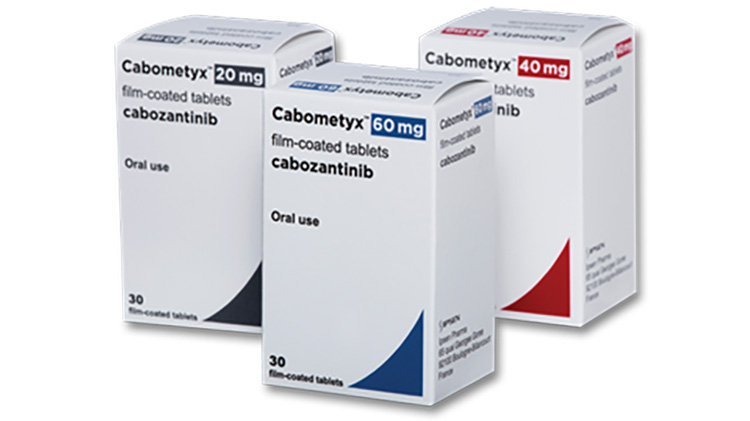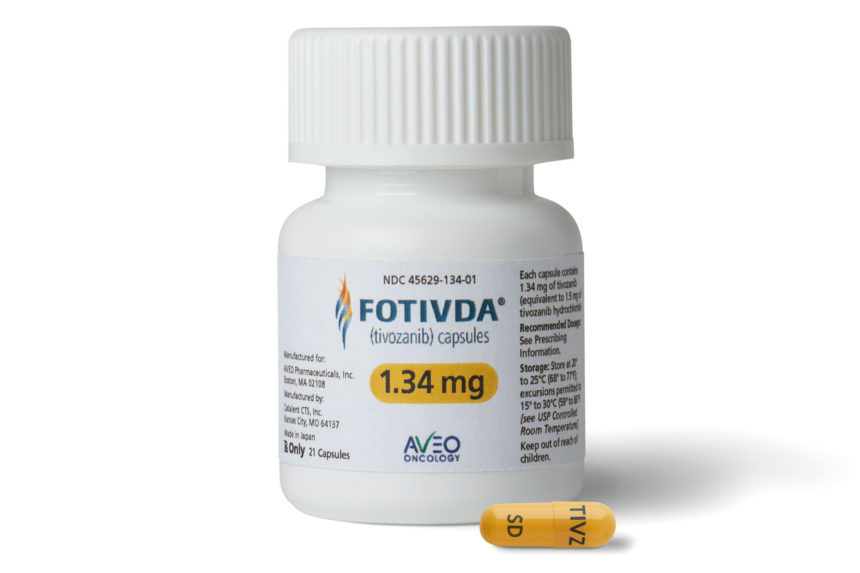Cabometyx (cabozantinib) vs Fotivda (tivozanib)
Cabometyx (cabozantinib) vs Fotivda (tivozanib)
Cabometyx (cabozantinib) and Fotivda (tivozanib) are both oral medications used in the treatment of advanced renal cell carcinoma (RCC), a type of kidney cancer. Cabometyx targets multiple tyrosine kinases and has shown benefits in overall survival, progression-free survival, and objective response rate; it is also approved for use in patients with hepatocellular carcinoma and medullary thyroid cancer. Fotivda, on the other hand, is a more selective tyrosine kinase inhibitor with a different side effect profile and has been approved specifically for adult patients with relapsed or refractory advanced RCC following two or more prior systemic therapies. When deciding which medication is appropriate, patients should consider factors such as the specific indication, their overall health, previous treatments, potential side effects, and the advice of their healthcare provider.
Difference between Cabometyx and Fotivda
| Metric | Cabometyx (cabozantinib) | Fotivda (tivozanib) |
|---|---|---|
| Generic name | cabozantinib | tivozanib |
| Indications | Renal cell carcinoma, hepatocellular carcinoma, medullary thyroid cancer | Advanced renal cell carcinoma |
| Mechanism of action | Tyrosine kinase inhibitor | Tyrosine kinase inhibitor |
| Brand names | Cabometyx | Fotivda |
| Administrative route | Oral | Oral |
| Side effects | Diarrhea, fatigue, nausea, decreased appetite, hypertension, etc. | Hypertension, fatigue, diarrhea, decreased appetite, nausea, etc. |
| Contraindications | Hypersensitivity to cabozantinib or any component of the formulation | Hypersensitivity to tivozanib or any component of the formulation |
| Drug class | Tyrosine kinase inhibitor | Tyrosine kinase inhibitor |
| Manufacturer | Exelixis, Inc. | Aveo Pharmaceuticals |
Efficacy
Cabometyx (Cabozantinib) Efficacy in Kidney Cancer
Cabometyx (cabozantinib) is a medication that has shown efficacy in the treatment of advanced renal cell carcinoma (RCC), which is the most common type of kidney cancer. It is a tyrosine kinase inhibitor that targets multiple pathways involved in tumor growth and angiogenesis. The efficacy of Cabometyx was demonstrated in a pivotal phase III clinical trial known as METEOR. The trial showed that cabozantinib significantly improved progression-free survival compared to everolimus, a standard treatment for advanced RCC. Furthermore, cabozantinib also demonstrated an increase in the overall survival rate of patients with advanced RCC, marking it as an effective treatment option for this condition.
Fotivda (Tivozanib) Efficacy in Kidney Cancer
Fotivda (tivozanib) is another targeted therapy approved for the treatment of advanced RCC. Tivozanib is a vascular endothelial growth factor receptor (VEGFR) inhibitor, which also targets the angiogenesis process that tumors use to grow and spread. The efficacy of Fotivda was evaluated in a phase III trial known as TIVO-3, which compared tivozanib to sorafenib, another tyrosine kinase inhibitor used in RCC. The results demonstrated that tivozanib significantly improved progression-free survival in patients with advanced RCC who had undergone previous treatment. Additionally, tivozanib had a favorable safety profile and was associated with fewer dose reductions and interruptions due to adverse events, compared to sorafenib.
Comparison and Considerations
When comparing Cabometyx and Fotivda, both medications have shown to be effective in improving outcomes for patients with advanced RCC. The choice between the two may depend on the individual patient's medical history, previous treatments, and the side effect profiles of the medications. It is important for healthcare providers to consider these factors when recommending a treatment plan for kidney cancer patients.
Conclusion
In conclusion, Cabometyx (cabozantinib) and Fotivda (tivozanib) are both effective treatment options for advanced renal cell carcinoma. They work through different mechanisms but ultimately aim to inhibit the growth and spread of cancer cells by targeting angiogenesis. Clinical trials have demonstrated their efficacy in improving progression-free survival and, in some cases, overall survival. As with any medication, the decision to use Cabometyx or Fotivda should be made on a case-by-case basis, taking into account the specifics of each patient's condition and treatment history.
Regulatory Agency Approvals
Cabometyx
-
European Medical Agency (EMA), European Union

-
Food and Drug Administration (FDA), USA

-
Health Canada

-
Therapeutic Goods Administration (TGA), Australia

Fotivda
-
European Medical Agency (EMA), European Union

-
Food and Drug Administration (FDA), USA

Access Cabometyx or Fotivda today
If Cabometyx or Fotivda are not approved or available in your country (e.g. due to supply issues), you can access them via Everyone.org.
How it works

Make an enquiry
Choose the medicine you want to buy, answer a couple of questions, and upload your prescription to speed things up. We’ll get back to you within 24 hours.


Make an enquiry
Choose the medicine you want to buy, answer a couple of questions, and upload your prescription to speed things up. We’ll get back to you within 24 hours.


Breeze through the paperwork
We'll guide you through the required documents for importing unapproved medicine, ensuring you have all the necessary information.


Get a personalized quote
We’ll prepare a quote for you, including medicine costs and any shipping, administrative, or import fees that may apply.


Receive your medicine
Accept the quote and we’ll handle the rest - sourcing and safely delivering your medicine.

Some text on this page has been automatically generated. Speak to your physician before you start a new treatment or medication.
Let's talk
If you have any questions, call us or send us a message through WhatsApp or email:
Contact us




